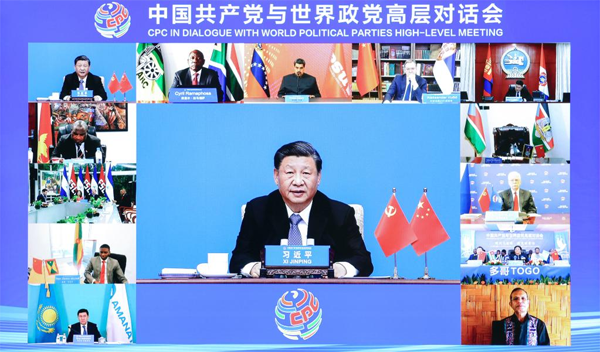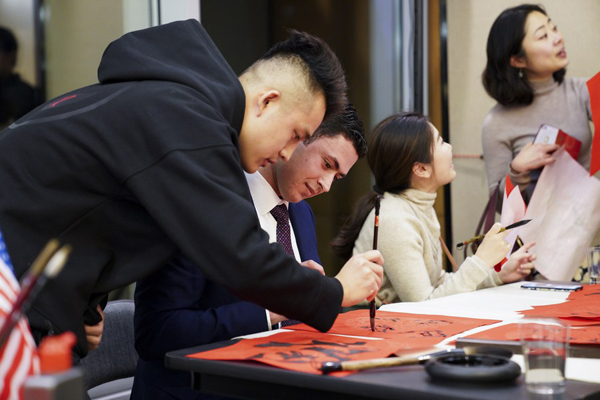Civilizations Don’t Have to Clash: China’s Global Civilization Initiative
May 16 , 2023By David Morris, a non-resident Senior Fellow at the Center for China and Globalization(CCG).
It’s time to find new ways to understand each other better and to communicate more effectively, to address serious challenges facing today’s world.
The world is confronting a perfect storm of new risks, in geopolitics, the economy, climate change and technology. Yet global leaders appear unable to agree on measures to defuse the risks. The United Nations Sustainable Development Goals, agreed by world leaders in 2015, are not on track to be achieved. Ambition and cooperation appear to have gone missing while countries have focused on domestic health, economic and other problems. Nevertheless, as part of China’s re-opening to the world after a long isolation during the Covid-19 pandemic, President Xi Jinping has made an interesting proposal for a Global Civilization Initiative. As a potential confidence building measure, it warrants serious consideration.
Until a few years ago, globalization and international interdependence appeared unstoppable, bringing development and modernization to much of East Asia and fuelling a dramatic expansion in trade, development and lifting hundreds of millions of people out of poverty. The globalization era was a time of relative peace and stability in East Asia, after the geopolitical conflicts of the Cold War. But a common expectation in the advanced economies was that modernization would also mean westernization. That did not happen, and a great disillusionment with globalization has now become entrenched in the United States, particularly focused on a new great power contest with China. To many, it seems like the “clash of civilizations” predicted by Samuel Huntington is indeed coming.
Most of the world, though, does not wish to return to the madness of a Cold War. A slew of world leaders has recently visited China, signing trade and investment deals, seeking pragmatic, mutual interests-based cooperation. Yet much of the English language media narrative maintains a distrustful approach to any form of engagement with China. As any diplomat knows, engagement and exchange is the starting point for changing the narrative from conflict to cooperation. The EU High Representative for Foreign Affairs and Security, Joseph Borrell, recently told the Center for China and Globalization that cultural and personal exchanges between Europe and China must be resumed as soon as possible after three years of interruption. He said the primary foundation of Europe-China relations should be mutual knowledge and respect.
Xi Jinping, general secretary of the Communist Party of China (CPC) Central Committee and Chinese president, attends the CPC in Dialogue with World Political Parties High-Level Meeting via video link and delivers a keynote address in Beijing, capital of China, Mar. 15, 2023. (Photo/Xinhua)
China’s President, Xi Jinping, has recently outlined his vision for cross-civilizational respect and understanding, which appears well aligned with Borrell’s observation that understanding and respect must be the foundation of sustainable relationships. The Global Civilization Initiative advocates respect and equality for the diversity of the world’s civilizations, proposes mutual learning, dialogue and tolerance. Based on common values of peace, development, fairness, freedom, it charts a different course than the tendency of some cultures to impose their values on others. This is potentially controversial within some of the so-called “West” but is not at all controversial in East Asia, where we have a long tradition of diversity and respect for multiple traditions and belief systems.
The challenge is how to take the set of principles outlined in the Global Civilization Initiative and turn them into reality, including in dialogue and cooperation with countries from the “West” that has long assumed its norms and values are universal, even as such norms and values change constantly. As Borrell observed in relation to Europe, the answer is to strengthen cultural and people-to-people exchange. The time is ripe to nurture new forms of dialogue and cooperation between civilizations, across all sectors. Understanding each other is the first step towards finding practical ways we can work together to address shared challenges.
There is no shortage of shared challenges. Even seemingly intractable geopolitical tensions can be defused and pragmatic confidence building achieved with greater civilizational respect. As an observer to the Northern Ireland Peace Process, I saw up close how one circuit-breaker in the long-running conflict was the widespread adoption of the concept of “parity of esteem”. Acceptance of the common value that each tradition has the right to exist proved, in the Northern Ireland case, to provide a valuable pre-condition for building peace. Equally, between the US and China, acceptance of “parity of esteem” would go a long way to taking the heat out of disputes and to allow us to focus on practical solutions.
Students write Chinese calligraphy during a New Year gala for Chinese and international youth in New York, the United States, Jan. 19, 2020. (Photo/Xinhua)
Civilizational engagement and better understanding of each other will be necessary as the global economy transitions move towards a more multipolar reality. Already, the focus of the global economy has shifted in many sectors to East Asia. Yet much of the world has little understanding of the Confucian and other traditions of East Asia or the region’s unique pragmatic, state-led development models that have created quite different economic systems from the traditional advanced economies.
The fast and ever-changing technological innovation is also confronting us with serious questions about values, norms and rules in relation to artificial intelligence, quantum computing, high-speed communications and the internet of things. We appear to be at the beginning of a new industrial revolution that will disrupt every aspect of the world we live. It is extraordinary that so little attention is being paid by world leaders to finding ways to cooperate and to regulate how automated decision making and complex digital interdependence will impact on our lives. Rather, a tech competition is in full play, because we distrust each other. Even at the height of the Cold War, rules and norms endured for nuclear safety, aviation and many other areas. Artificial intelligence, however, may require us to engage seriously in cross-civilizational dialogue before we can agree guardrails to protect us all.
Perhaps the biggest risk facing the planet is climate change, which knows no borders and can be solved by no country alone. The climate crisis underlines the importance of cross-civilizational dialogue and respect. We are one earth. How we as an international community manage the transition to a more sustainable economic model will define us. This is the ultimate question for a Global Civilization Initiative to grapple with and to offer us new ways of thinking about how we cooperate in a high-risk future.
It’s time to find new ways to understand each other better and to communicate more effectively, to address these serious challenges facing today’s world, and facing us all, regardless of the difference of civilizations. It will take real engagement and more than just words. Indeed, words alone can sometimes be a barrier to understanding. A decade ago, after Xi Jinping announced “One Belt One Road”, it became apparent that the phrase sounded unnecessarily aggressive in the English language. It was soon re-branded the Belt and Road Initiative. A humble suggestion therefore might be to comprehend this new initiative as the Global Civilizations Initiative. Using the plural “civilizations” might help prevent any misunderstanding that the concept is about one way forward, but rather a respectful proposal for a multi-polar, diverse and equal future for the world’s civilizations. More important than the words, though, will be the actions.
From China Focus, 2023-5-16
Topical News See more










